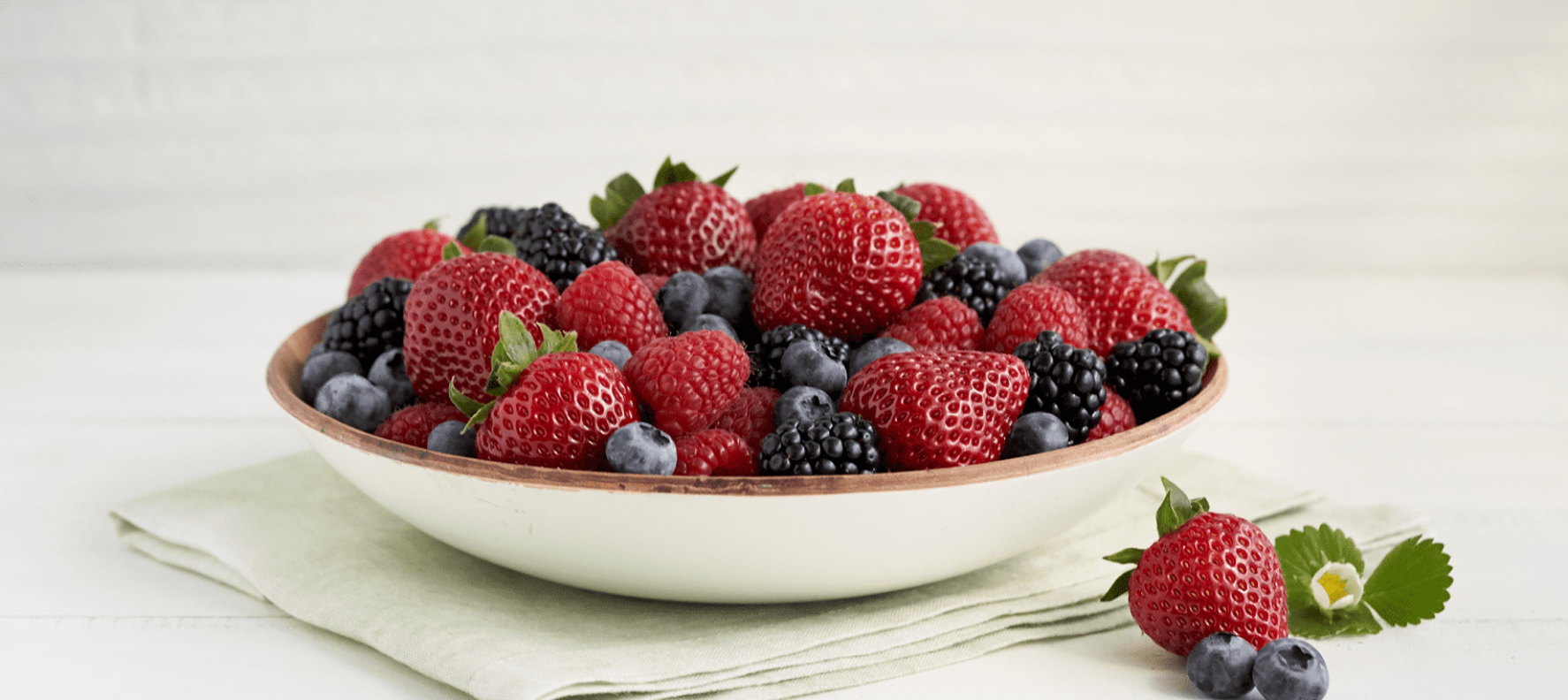Berry lovers unite
Join our community for tasty recipe ideas, handy hints, seasonal fun facts and more.

Where can I buy Driscoll’s berries?
Driscoll’s berries can be purchased at most supermarkets throughout Australia, throughout most of the year. You can check seasonal availability here.
What types of berries does Driscoll’s offer?
You’ll find strawberries, raspberries, blueberries and blackberries packaged under the Driscoll’s brand.
What should I look for when selecting berries at the supermarket?
This depends on what type of berry you’re buying.
When choosing strawberries, look for punnets that contain brilliant red berries with an even, rich sheen. They should be clean and dry, and the leaves and stems should be bright green.
When choosing raspberries, look for plump, brightly coloured berries that have a soft, hazy gloss and are free of dents and bruises. Raspberries have tiny hairs on them called ‘styles’ – these are natural, and don’t affect the taste or ripeness of the berries.
When choosing blueberries, look for dry, plump berries that are free from bruises or dents. Fresh blueberries have a hazy white coating called ‘bloom’ that helps to keep them fresh. Avoid berries that lack bloom.
Finally, blackberries range in colour from deep blue to purple to black. Choose berries that are deep and evenly coloured. They should be plump and dry, and have a smooth sheen.
Do berries continue to ripen after they’ve been harvested?
No, berries don’t continue to ripen after they’ve been harvested.
What is the best way to store berries after I purchase them?
All fresh berries are highly perishable, so you should pop them straight in the fridge after purchase. This will extend their shelf life. They’re fragile, too – so keep them in their packaging until ready to eat.
Do I need to wash my berries before I use them?
As with all fresh produce, we recommend that you wash your berries before enjoying them. However, hold off on washing them until you’re ready to eat them – the moisture will decrease their shelf life.
Can I freeze fresh berries?
You sure can! Here are some helpful tips about freezing berries.
Tip: If you have spare time and extra room in your freezer, place berries in the freezer on a baking tray and pack them into containers as soon as they are frozen. Freezing berries this way prevents them from sticking together, making it easier to measure out when you need them.
How are Driscoll’s berries harvested?
All our berries are hand-picked and field-packed, with the exception of blueberries which are packed in packing facilities.
Does Driscoll’s add colour or artificially enhance its berries?
No, Driscoll’s berries are naturally sweet, flavourful and bursting with colour. Our mission is to continually delight our berry consumers by providing “Only the Finest Berries” and we achieve this by perfecting our berry varieties through years of breeding.
Are Driscoll’s berries genetically modified (GMO)?
No, Driscoll’s berries are not genetically modified. Our Research and Development department is the industry leader in the development of premium berry plants that use natural and traditional breeding processes to create our delicious berries.
Does Driscoll’s use pesticides?
Driscoll’s primary concern is for the wholesomeness of our product and the safety of berry consumers. To reduce the use of pesticides, our independent farmers use an Integrated Pest Management (IPM) method, which uses a combination of natural and synthetic means to reduce disease and control pests.
Are any of Driscoll’s berries irradiated?
No, they’re not. Irradiation is a process that preserves food by using a low dose of high energy gamma rays to kill any germs and insects, thus slowing the maturation process and extending shelf life. Driscoll’s doesn’t use irradiation because we believe our harvest and cooling processes are highly effective in maintaining fruit quality and shelf life.
Where can I buy Driscoll’s berries?
Driscoll’s berries can be purchased at most supermarkets throughout Australia, throughout most of the year. You can check seasonal availability here.
Can Driscoll’s ship directly to the consumer?
Driscoll’s doesn’t sell or ship berries direct to consumers. You can find our premium berries in supermarkets around Australia, at most times of the year.
Does Driscoll’s sell their berry plants?
Afraid not! Driscoll’s unique variety of berry plants are patented, which means they can’t be grown by anyone other than our independent farming partners.
Why don’t you have a ‘best used by’ date on your berry packages?
Driscoll’s has a strict Quality Assurance Program in place from the field through harvest and distribution. We work hand-in-hand with our distribution and retail partners to make sure the berries you purchase are of the highest quality. Many factors can affect the shelf life of our berries – from the location of the farm, to the weather, growing practices and the type of plant. Due to these varying factors, a ‘best used by’ date isn’t applied. We recommend consuming the berries soon after purchase.
Does Driscoll’s have a global food safety program?
Yes, we do. Our stringent International Food Safety program ensures that our berries are produced with the highest standards of safety regardless of where they are grown. The program includes third-party audits, product testing and grower education.
Are Driscoll’s packages recyclable?
Yes, they are. Our containers are made using PET, or Polyethylene Terephthalate. You’ll find the international recycling code stamped onto each pack, with the recycling code #1. This is the most acceptable recyclable packaging.